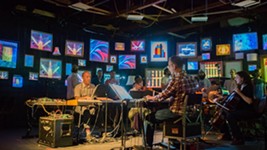Scanlines
Fri., March 6, 1998
|
|
2001: A Space Odyssey
D: Stanley Kubrick (1968)
with Keir Dullea, William Sylvester, Gary Lockwood, Daniel Richter, Douglas Rain as the voice of HAL
Hackers
D: Iain Softley (1995)
with Jonny Lee Miller, Fisher Stevens, Angelina Jolie, Matthew, Lillard, Lorraine Bracco, Penn Jillette
WarGames
D: John Badham (1983)
S: Matthew Broderick, Dabney Coleman, Ally Sheedy, Barry Corbin, Michael Madsen, John Wood
Sneakers
D: Phil Alden Robinson (1992)
Robert Redford, River Phoenix, Ben Kingsley, Mary McDonnell, Sidney Poitier, Dan Akroyd, David Straithairn
As technological ad- vances have outpaced their own consumer usefulness, they have also left behind our ability to effectively incorporate them into movies. There is, in this sampling of films, a time-dependent inverse relationship between the "techno" and "thrill" in the techno-thriller, at least as far as computers (as opposed to Terminators or Lawnmower Men) are concerned. In other words, better technology does not make better movies.
In Stanley Kubrick's 2001: A Space Odyssey – the sensical part of it anyway – a computer goes a little nuts and in an all-too-human twist decides to seek self-preservation. The entire project of the film is a little more epic in scope and complex in depth, but that's the gist. WarGames is far simpler. A kid breaks into a less paranoid computer, wants to play a game of thermonuclear war and almost destroys the entire planet.
In both 2001 and WarGames, the people are powerless and left to suffer the consequences or the fear of the consequences of what they have inadvertently wrought. And in both scenarios the bystanderism is pretty gripping stuff. More recent films like Sneakers and Hackers have also used technology and computers to help drive their stories and attempt to create such suspense. Sneakers: With all kinds of gadgetry at their disposal, the good guys try to keep the bad guy from using the little black box to shut down entire coastal power grids, disrupt air traffic control systems, or flat out burglarize big banks. Hackers: a good geeks-bad businessman story where a bunch of hackers band together to save themselves and nail the evil corporate empire (and story aside, casting Fisher Stevens in any flick is a bad idea). Both stories are predictable. Hackers has the added defect of being vapid. What may be the salient distinction here, however, is not anything as tired as "older is better." The substantial difference between a 2001 and a Hackers (as well as many of its recent brethren) is the difference between a computer as a character as opposed to a computer as a machine functioning simply as a plot accessory. The latter are still man vs. man stories. The HAL 9000 in 2001 and to a lesser degree the WHOPR in WarGames were harrowing presences because their characters were incapable of responding to situations with any sort of flexibility and their perceived bad-guy status wasn't so much of a construct because all the computers were doing was what any computer is capable of doing – "responding" to their programming; their programming by humans, who are (need you be reminded?) fallible. The HAL and the WHOPR were the story.
The encryption box in Sneakers needn't even have made a physical appearance and it wouldn't have made a difference in the movie (no, technically it's not a computer in and of itself, but it is purposeless if not used in conjunction with one; so it is guilty by association). Sneakers still works, but that's only because any well-scripted story works (and this film comes from the writers of WarGames). The technology is more of a "Hey, neat" variety than truly terrorizing or interesting. The lack of interest or terror could also be becuase "encryption" doesn't threaten people with quite the resonance as "nuclear war." All of the technology in the world can't make Hackers interesting – although it is pretty to look at. Maybe people vs. computer scenarios are inherently more interesting because in the real world we haven't had to deal with the full impact of what could go wrong and what the little soulless boxes could do to us – not on the scale encountered here anyway. It's fun to terrorize ourselves with the thought of the potential horror stories that we might create when we continue playing supreme being with silicon.
Everybody (except geeks cooped up in their MIT labs) is suspicious to some degree of what's waiting inside the little circuits. It doesn't take an act of robots gone mad to make you weary. One fucked-up bank statement is enough to plant the seed: "What happens when the computer in charge of the NYSE makes the same mistake?" Oops. Useful? Certainly. Dangerous? As yet unknown, but that unknown can make for some good storytelling.--Michael Bertin







